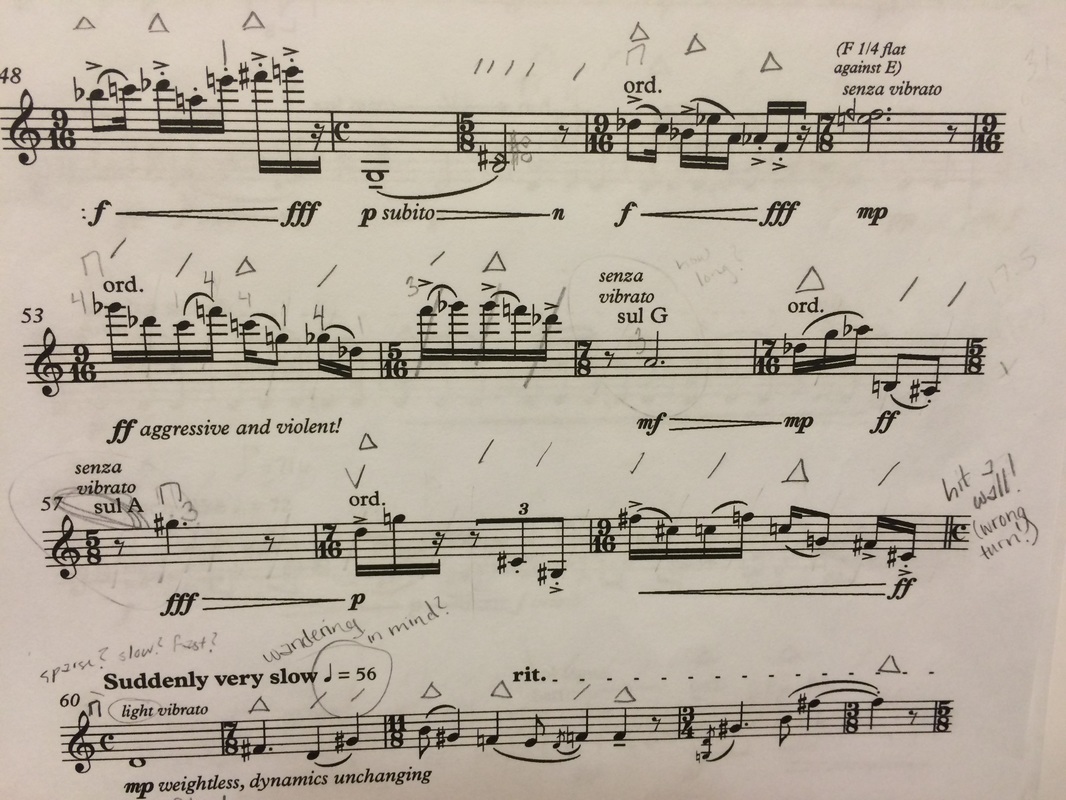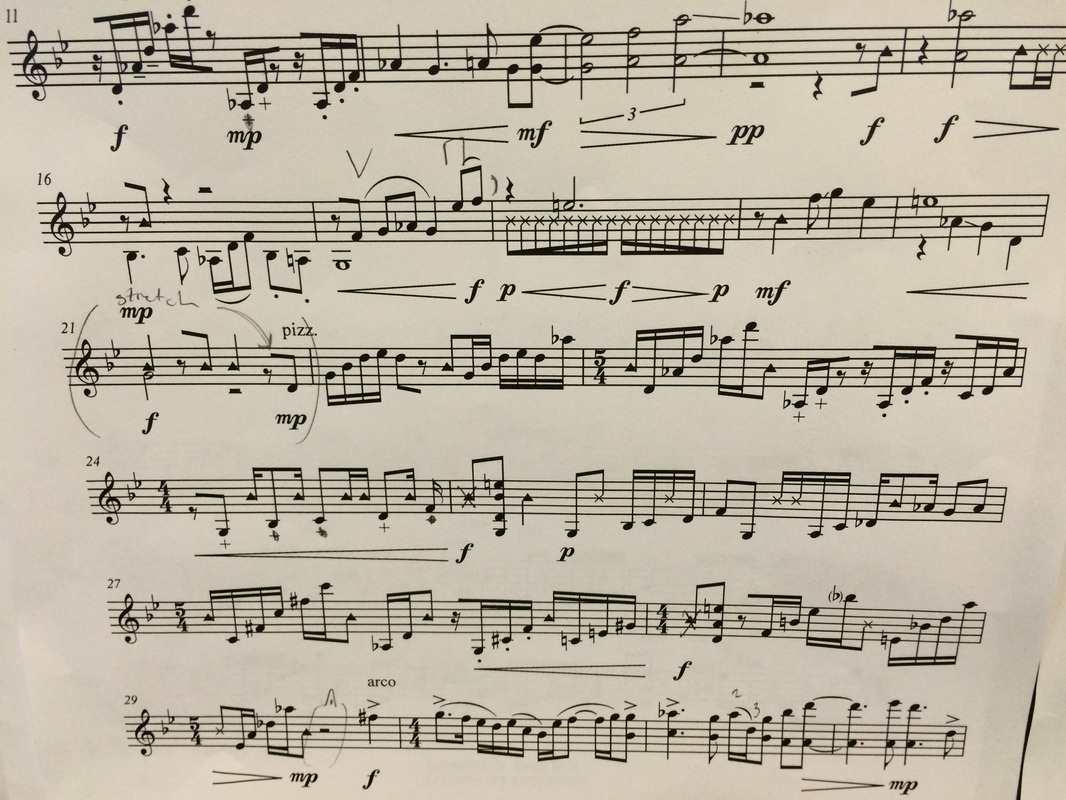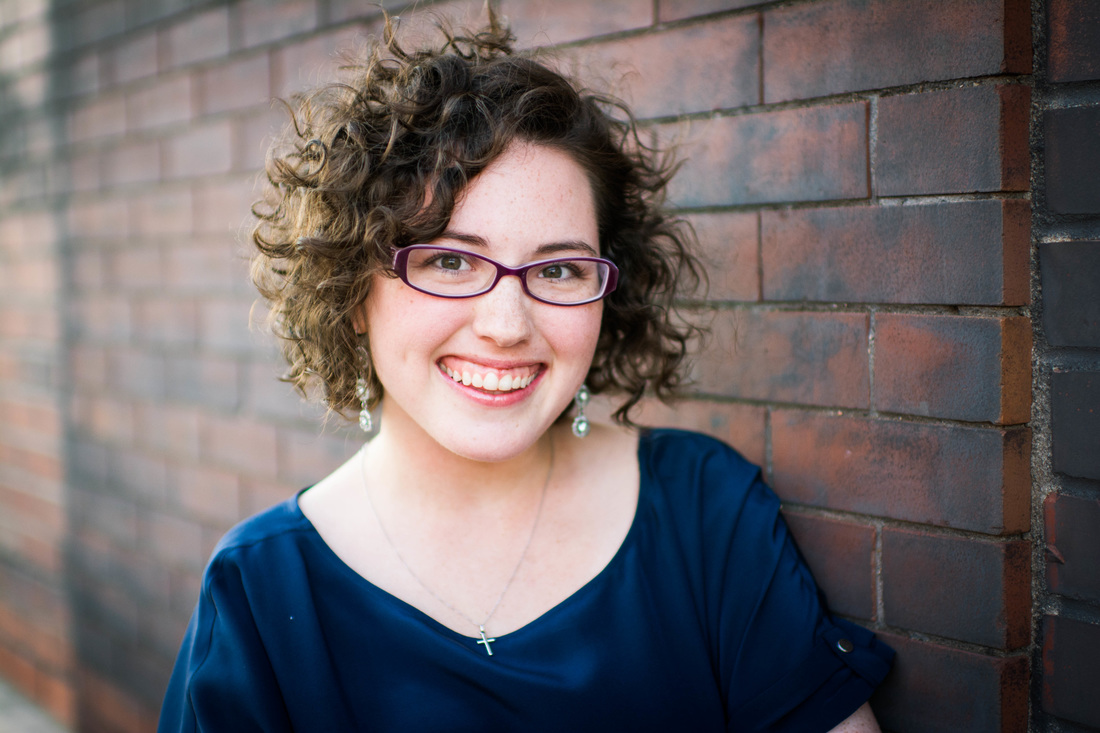|
When I did my re-introductory post a few weeks ago, I asked for suggestions for blog post topics in the comments. Today, I decided to tackle one from Tony Manfredonia that definitely was a challenge for me to blog about! He commented with:
“What I’d love to hear is if you’ve ever come across a piece (even if you leave it anonymous) that you played, you weren’t fond of. New music, particularly. Was it commissioned? Were you assigned it? I’d simply love to hear if you’ve ever struggled with “enjoying” a new piece of music and how you handled it.” On a post that asks about overcoming the challenge of not being fond of a piece, I should probably preface this with the general notion that I desperately seek connection to any piece I play even if I’m not fond of it Even in pieces that I absolutely adore, I’m constantly seeking a deeper connection with it. That’s something which is central to me as a performer- I’m always seeking to know a piece better so I can share it more fully. I’ve done a number of sometimes (crazy) things and found connections that may seem tenuous, but they speak to me so I can “speak” the piece for an audience. So, if I’m seeking connection in something I love, you’d better believe I do the same even more fervently for a piece I just “don’t get” yet (and I believe yet is ALWAYS the key word in this case). In my younger days (read: 10+ years ago), I struggled to connect with Mozart. I thought his music was too happy and not emotional enough. It didn’t make me feel enough, anyway. I was THAT person who would very loudly proclaim to my friends how much I didn’t enjoy his music when I was “stuck” playing it. His 5th violin concerto in particular was especially difficult for me to appreciate even though it’s an absolutely wonderful piece of music. However, when I studied the 4th violin concerto a couple of years later, something clicked with me because I was the same age as Mozart was when he had written that concerto. Suddenly, everything about it seemed more relatable. Since then, I’ve held a high regard for that concerto and, more importantly, a greater respect for Mozart. I still don’t actively seek out his music to listen to or play (although I love his chamber music now), but I have a much greater appreciation for the nuance and operatic drama that infuses his work. I share this particular example because, though I’ve often struggled to appreciate many pieces of new music, it’s more about lacking a connection with the piece or composer than finding an aesthetic difficult. I’ve had a number of challenging pieces written for me over the years. Some I absolutely loved even though I struggled to figure out how to inflect the phrasing so I could bring them to life. Some, I desperately wanted to love, but found that I couldn’t wrap my mind around form or phrase. Still others were so personal that I had to explore emotionally painful things for me and the composers who wrote them for me. I remember once that I struggled to connect with a piece, but a timeline forced me to play it before I fully understood it. I felt awful because it felt so unfinished even though I put everything I had into the piece. I knew the composer and respected how he talked about music so a personal connection wasn’t the problem. With all of the analytical tools I had available to me at the time, I did the best I could. I looked at form, planned gestures, and made comparisons to actions in my life that bring me clarity (journaling). I still wasn’t satisfied with my performance. Thinking about this topic, I still feel guilt about “leaving something on the table” with that piece although I’m not sure I could have done anything differently. It comes down to being willing to find that connection. You may never like a piece even if you desperately want to. It feels awful if it’s written for you and you don’t like it, but you can’t force yourself to like a piece that you just…don’t. However, if you refuse to challenge yourself to delve deeply into it anyway, you’re doing yourself and your collaborator a terrible disservice. Here’s my advice when faced with a piece of music you just “don’t get”: 1. Be willing to look for connections. You’d be willing to do it for pieces by some dead guy you never knew, how much more should you do be willing to find connections for a piece written by someone in your life? I promise that you’ll find something. Even if it helps with the smallest portion of the piece, it’s helpful. 2. Do the thing that seems crazy to understand a piece. I once practiced a piece based on a yoga vinyasa in the poses as much as possible (there’s photographic proof on instagram if you’re willing to look back that far). Standing with my legs in Warrior 2 (I couldn’t extend my arms out since I was playing) was surprisingly helpful for understanding the phrasing in that particular section. 3. Be willing to go to difficult emotional places. There have been a couple of pieces written for me that have felt so personal that I was taken aback by being given that kind of emotional content. I’ve learned that if a collaborator chooses to write a particular piece for you, they trust that you’ll say what they give you when you play their pieces. It’s a privilege so don’t take it lightly. Performers, what have you done to help connect with a piece of music you “don’t get?” Please share your advice in the comments below! If you liked the change of pace in topics from my list (yes, I keep a list that I want to write about), leave me a suggestion. I’ll probably use it. :)
1 Comment
Wow. Really, wow. After giving my "There Is No Comfort Zone" recital yesterday, I literally went home, sat in my pajamas, and was overwhelmed in the best possible way. Overwhelmed by the love and support of family, friends, and colleagues, I started reflecting on all of the work that went into putting this performance together. Aside from actually preparing the music, there was a lot of communication between myself and the composers, setting a date, getting a venue, rehearsing, writing some of the program notes, and then promoting the recital. I've never done all of that myself before and it was an eye-opening experience for me. It's said that the performance is only the tip of the iceberg and that couldn't be more true! Suffice it to say, rest didn't come easily for me post-performance and, in my excitement, I started thinking about how to expand this project to make it more varied and sustainable. I was also fortunate to get to catch up with each of the composers either in person or via Facebook, for those that aren't local, and talk about the performances, the experience in general, and getting them recordings. One conversation turned into a "hey, how do I notate these sounds for the next movement of this piece?" (yes, I premiered one movement and we're discussing the next on the same day because we're cool), while another turned into a discussion about all of the hilarious things that happen during a performance ("I FORGOT TO BREATHE WHERE YOU TOLD ME TOO!"), and a third inspired this blog post. While I sat in my post-recital happy stupor, I had a lovely conversation with Stephanie Ann Boyd about the Oklahoma premiere of "Amerigo" and my general experience preparing for this recital. I shared comments from the audience, some of my own insights, and hopes about performing the piece again soon. One thing that has come up over and over as I've been having conversations with these composers is my goal to perform these pieces again multiple times. I was challenged during the preparation because there isn't a common performance practice for them (yet!). A piece that has been performed hundreds or thousands of times has had the kinks worked out of it. I literally found more "kinks" once my adrenaline was pumping during the performance yesterday. The opportunity to perform them again will give me the chance to figure out how to respond in a way that honors what the composer wrote and makes musical sense. As I begin listening to the recital recording (always a scary endeavor and often put off for at least a week, if not a months!), I have the chance to reflect on my inspiration for the interpretations of each piece and gauge their effectiveness. The pedagogue in me is also eager to explore them again, not just to share them with a new audience, but to figure out how to teach them. One of the most gratifying moments for me was to look into the audience and to see students of mine listening. I loved being able to share with them the creative things I do (besides teaching them) and to be able to talk with them about the music I played. One of my young students has decided that she wants to learn "Amerigo" (someday) and I couldn't be more excited. I would love to teach all of these pieces to my students when they're ready for them! To close, I have a few random anecdotes from this experience to share that I hope will provide a little insight into the joy I have received from this project and maybe cast a humorous light on the thoughts of a musician during/post-recital. 1. During the recital, a young 2-year-old (best guess at her age) would start giggling whenever I had to stomp or played something that sounded really weird. One time when she did this, I got a giant smirk on my face and my mom almost got the giggles herself watching me smirk. 2. I just started listening to the recording and I had to stop because hearing my voice when I introduced the program is strange. I had a moment much like Yzma in The Emporer's New Groove when she was turned into a cat and asked, "Is that my voice? Is that MY voice?!" Don't worry, I sounded more like me when I started playing. (I also included the movie clip just in case the Disney fan in you wants to geek out.) 3. After the recital, my dad told me and many other people about how "this recital wasn't just out of the box, it OBLITERATED the box." 4. I've begun to process this experience in a public setting, but I have a lot more to process yet in my journal as well. 5. I need to give a giant shout out to my roommate's dog, Mac, for listening to me practice this music a lot over the last month or so. He usually sleeps through it, but one day last week, he gave me a giant glare when I walked out of my room to get something. I'm guessing he didn't like those sounds!
My struggle has perplexed me. Immediately, I become concerned that I may not be able to cultivate a relationship between the audience and the music. As I think about that concern, though, I realize that it may seem a bit presumptuous. My ability to find a connection to a piece of music is not indicative of my audience’s ability to do so. I can’t assume that I’m completely familiar with their musical or life experiences! However, when I play a piece of music, my goal is to find what is relatable and speaks about being human in the piece. My job is to make those things so abundantly clear that it has an effect similar to being “smacked in the face with a billboard” (to use one of my favorite phrases). I begin by looking for something familiar and keep exploring from there. Sometimes, I’m incredibly surprised by what I find. Aesthetics that I’d never expect to relate to or understand become a challenge for me to unravel rather than something that terrifies me. Oh, and I have a ball doing it! Exclamations of “THIS IS SO COOL!” are just as prevalent as “wow, weird!”
As I’ve studied each piece, I’ve come to realize that each piece represents some mood or idea. Of course, I don’t actually know what the idea is for at least one of them yet (another way that I’m out of my comfort zone!), but that’s why we perform pieces over and over again. Each time we study and perform a piece of music, we’re different people and bring something new to the piece. Each piece becomes rather like an old friend- their behavior patterns, preferences, and stories are familiar, but you still learn something new from them every time you encounter them. It’s a distinct privilege to put together a program like this and I’m grateful that I can share my experiences with you!
Brief commercial: Please check out my upcoming events page for details about the recital featuring these pieces. I’d love to talk with you about your experiences with these pieces. I hope to see you there! |
Archives
November 2018
Categories
All
|



 RSS Feed
RSS Feed